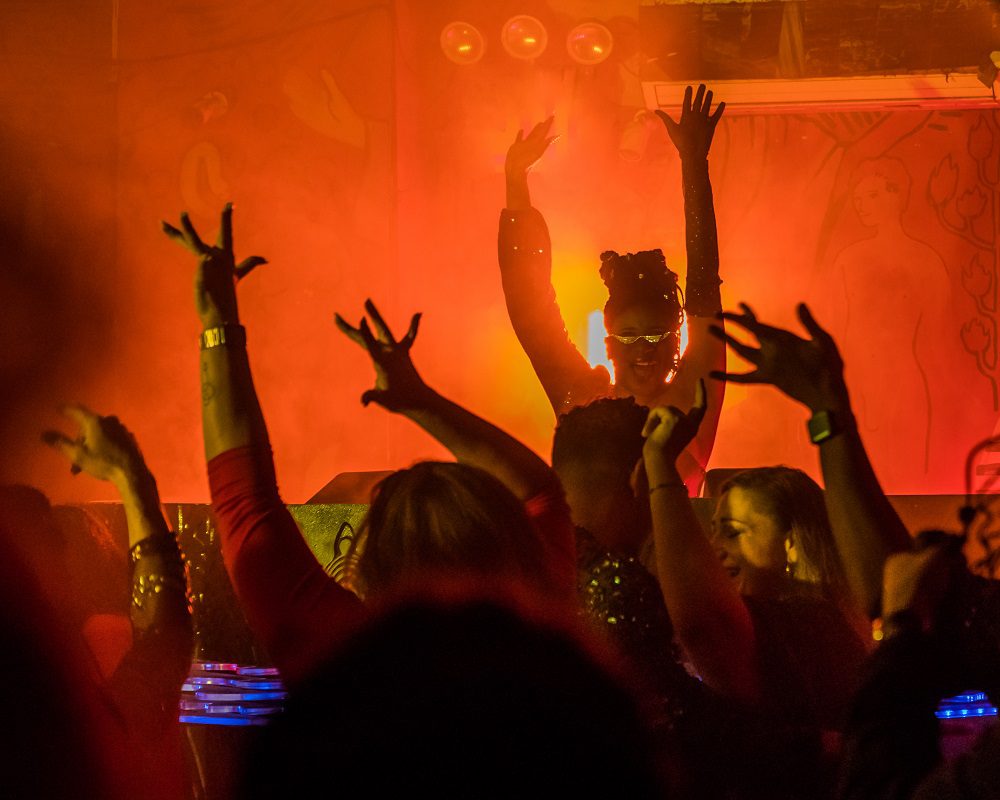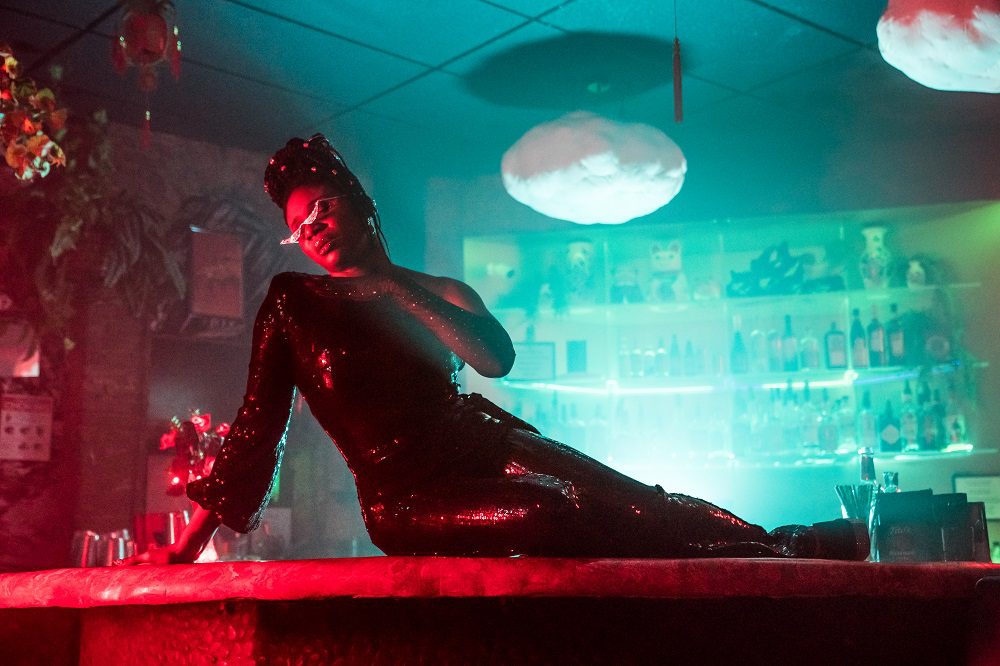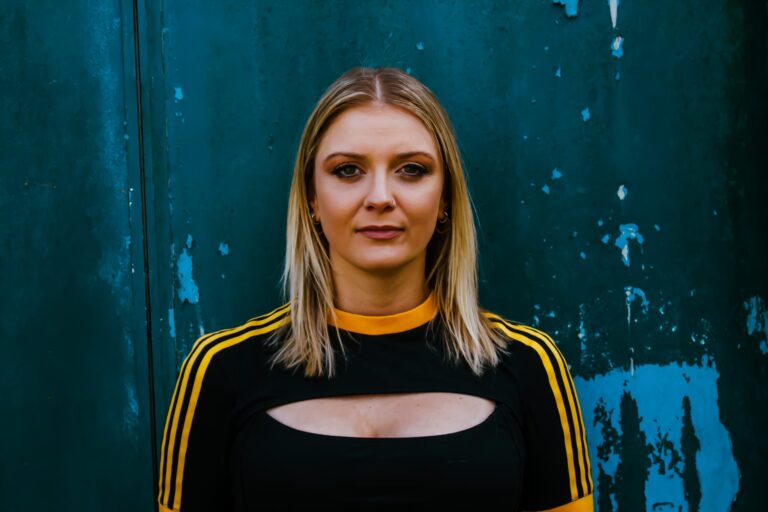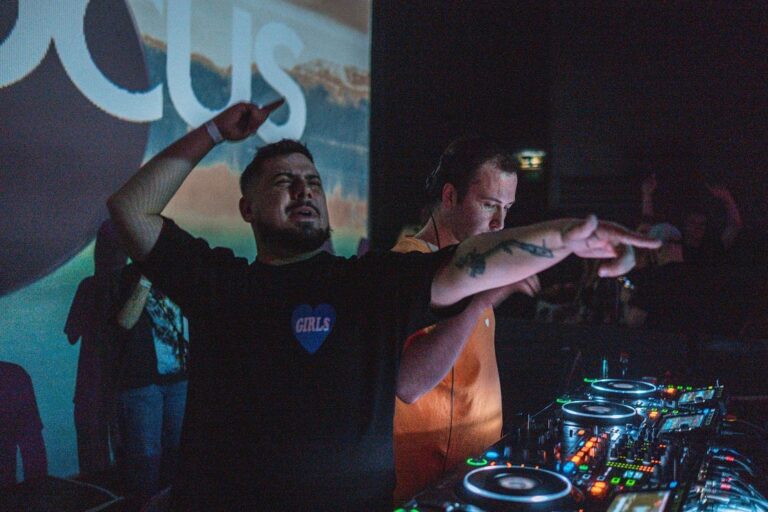Credit: Over The Rhine Film Festival (2022, Cincinnati OH)
The title game-changer is liberally hurled around like emojis on a Twitch stream. Luckily on the more innovative, forward-thinking side of electronic music, it’s often justified… But very few artists can live up to it in the way Lachi can.
A blind black American woman, Lachi is on an incredible mission to break down barriers and empower a new generation of disabled artists. In her own words, Lachi wants to “elevate disability culture by making this new brand of diverse celebrity in a competitive ‘not sorry’ way.”
Setting dizzyingly high benchmarks herself, she wears a multitude of caps on any given day; as an ambassador of diversity and inclusivity, her journey has taken her all the way to the White House Office of Public Engagement and regularly sees her influencing change at huge corporate megabrands.
As the founder of the organisation RAMPD (Recording Artists And Music Professionals With Disabilities) she’s representing and empowering a whole new generation of artists. RAMPD was responsible for bringing ASL (American Sign Language) to the Grammys, a prestigious organisation which she has recently joined the board of as a governor.
Most importantly for the purpose of this UKF interview, she is a singer, songwriter and performer who absolutely slays it. Flexing the full electronic music spectrum, over the years Lachi has worked with artists ranging from Maduk to Marcus Schultz, bringing her powerful signature to every genre from trance to drum & bass.
Developing from a role more behind the scenes as a featured artist and topline supplier, she’s now come centre stage and truly beginning to own her art and create her most meaningful collaborations. Her latest single – Bad Choices with Guy Faux – is a great example. Released last week, which was Deafblind Awareness Week, courtesy of Reid Speed’s Play Me label, it comes complete with an ASL video of deaf and blind people reveling in a club which you can watch on Broad Stream here.
With plenty more game-changing maneuvers in the pipe-line, we called up Lachi to find out more.
There’s so much to ask you, and things seem to be going at a million miles an hour for you… You’ve just been made a governor at the Grammys, for example!
Oh yes. There’s a lot going on! You’re catching me at a good time; the single is out, we’re about to go on tour, we got a lot of cool things happening at the same time. It’s great!
A lot of things are blossoming…
That’s right. Things are beginning to take shape. The seeds have been in the ground for a long time, and now I’ve found some water to sprinkle, so the trees are starting to grow.
What was the water? Was it lockdown? Was it a combination of a lot of things?
A multitude of things, I would say. I’m a very different person to who I used to be. I’ve come out of my shell, accepting the fact I’m blind and going more blind every day. Yes, the lockdowns did change a lot of things, leveling the playing field to a certain degree. To cut a long story short, my manager passed away from covid at the very start of the pandemic and that did become a very big catalyst for a lot of personal changes. I reflected on how I’d spent so long spinning the wheels but never quite getting off the ground. I thought, ‘Okay what can I do?’
Bottom line, it was about really embracing my disability. Like, ‘Alright, I’m black, I’m a woman and I have a disability. This makes me interesting, unique, and I shouldn’t try to hide this and blend in with the crowd.’ And when I finally embraced it, it was truly a pivotal moment.
From reading interviews with you, it seems like you’ve been doing that for a long time anyway? Especially how you embraced music at such a young age…
Music has been a huge part of my life . My parents had wanted me on the straight and narrow, to have a safe, reliable job. But music had done so much for me. Made me confident, able to express myself. It was my best friend when no one would listen.
I could have had my whole life set with a more conventional job – health care, vacations, promotions. I had it all mapped out, but I wouldn’t have been fulfilling my purpose. So I said, ‘Okay music, let’s do this. It has to work!’
A leap of faith! It’s really interesting hearing how you’ve developed musically. I went back over early tracks like Bug Out and you’ve explored so many different styles and genres…
Well… I’ve always had varying degrees of managers. Depending on my manager at any given time, I did what they coached me to do. Go this route, go that route. I was told to go down the pop rock route but found I was too black [laughs]. Then another manager said, ‘Oh you’re a black girl who plays the piano, you should go the R&B route’ but found I wasn’t black enough for that!
I found comfort in dance music. I liked that the focus was more in the ideas and thoughts and not what you looked like. As long as you get people thumping and bumping, right? So I got into dance before I signed with my previous manager, Gary. He heard my voice and signed me. While I still just followed whichever direction he pointed, we had some great success. For instance, collaborating with Marcus Schultz. But when he passed away, I decided to find my own musical voice. I want to tell my own story. Instead of fitting my vocals to a producer or DJ’s sound, having the producer fit in to my experience. And that’s pretty much where I’m at now.
Have producers welcomed that? It’s much more like a proper collaboration that way isn’t it?
Yes. Before I had my own personal brand, I’d be told what to do and follow along. Now I’m doing my own thing and finding my message in every song. I’ve found that when I’m talking to the producer, truly collaborating together to tell a joint story, then it is so much better, everyone bringing their vast life experience to the musical table.
That’s great. Have you found any particular space in electronic music where that happens best or where you feel most at home?
My secret favourite is hip house. No one talks about it because it’s generally seen as a bit dated, but I love Azealia Banks, Jaxx Jones and all the folks mixing modern rap over house beats. I actually have an album project I’m currently working on where I explore myself as a black, blind female trying to make it in America, and the album vibe is set to the stompy sounds and catchy hooks of the Pop Rap meets House direction. I’m excited to get lost in that.
Hip house was hugely influential in bringing the worlds of hip-hop and dance together and was a big influence on the early days of jungle. That project sounds really interesting. I also really like what you said about the anonymity of dance music and how that gave you some freedom…
Right! And it’s funny. When Far with Marcus Schultz blew up in the trance scene, people would say to me, ‘I had no idea you looked like that!’ Though generally polite, of course they meant, ‘I didn’t know you were black!’ So yes I did find freedom in the fact that who I was and what I looked like didn’t have to be attached to the song unless I wanted it be. But I have a lot more freedom now more people do know who I am.
Absolutely. And Bad Choices with Guy Faux definitely has a lot of attachment. How did you link with Reid Speed?
I’m all about empowerment for women, for black people, for people with disabilities, and only want to do meaningful collaborations. Through my pursuit of that, Reid and I eventually met. It was actually through someone at Symphonic, who Play Me use for Distribution. I believe they put out some articles highlighting women to know in the industry, and both myself and Reid were in them.
Right at that time Guy Faux and I finished putting Bad Choices together. Broad.stream, the streaming service for Broadway, yes that Broadway, along with the UpUntilNow Collective wanted to fund an ASL music video by a black female artist, and thus Bad Choices was a perfect fit. But we then needed a label partner. Of course I wanted to find a woman-owned bass label and figured that would be impossible, but alas there we were, Reid and I both being highlighted in the Symphonic newsletter. We met on a Zoom call and she had play the song right there and then. Thankfully she loved it. The call was a lot of fun, I love how straight talking Reid is. She and Guy Faux hooked up for some final tweaks and voila, it came out right at the time of Deafblind Awareness Week.
The stars aligned! Will you work with Play Me and Reid more in the future?
I really enjoyed working with Play Me for sure. Most labels harness varying degrees of shit-show but Play Me is seamless and so easy to work with. Reid is a legend, and refreshingly blunt. We have a great rapport. So I can definitely see more there.

Haha, I have to laugh at the shit show remark! Okay how about this… You work across a lot of sectors as an artist, an actor, a spokesperson and ambassador. On the shit show scale, how does the dance music industry compare to other sectors you’re part of?
Haha! Well each industry is so different, right? Diversity, Equity and Inclusion is an industry in itself these days, and I find myself in boardrooms presenting to top brands as a DEI expert. On that side of things, most folks love that I’m also an entertainer. When it comes to diversity and inclusion, presentations are either super boring or inviting feelings of anger, regret or pity. Then I come in big smiles, wearing a flashy gown and holding a glammed out cane – and I’m loud, proud and having fun. Sometimes I may weave song and piano into my keynotes.
Oh wow. Nothing to be bored or angry or sad about there. You’re flipping it!
Exactly. And on the music side of things…well, the music world, especially EDM, is very small. So I’ve been privileged to be that first blind or disabled person folks in the industry meet. Being fun and approachable, I get to help people see that world they haven’t seen.
They can feel safe to ask what being blind is like. You don’t get to ask that question comfortably very often. So I get to be that advocate and ambassador empowering disability in the music world, while being the all smiles entertainer in the diversity and inclusion world. And all throughout, I’m just having a lot of fun being Lachi.
That’s amazing! And of course this all comes together with RAMPD, right?
Yes! I founded RAMPD last year, and it was launched this year. We worked to get a visible stage ramp at the 64th Grammys and ASL on the red carpet. We’ve done so much already and are finding much momentum despite society’s barriers. RAMPD is all about removing barriers and generating visibility and equity for all disabled artists on a competitive level, so the next generation have the role models they deserve.
What have been the highs you’ve experienced so far?
For RAMPD, the Grammys was game changing, of course. We’ve also been sponsored by the Mayor’s Offices to run programming, have teamed up with top music organizations like Folk Alliance, NIVA and Women In Music. We’ve also won a Nightlife United award for the Social Justice category and have been given some funding through these various efforts. We have great folks in our membership and representing us, so yeah there have already been many highs.
We’ve been approached by labels and streaming services to help us develop new cultural ambassadors, storytellers and influencers. Music is the easiest way to understand a new culture. Like how hip-hop has elevated Black culture. Or how different electronic music genres have different cultures – a drum & bass party is very different to a trance party, right?
Cultures are truly elevated through music and we want to elevate disability culture by making this new brand of diverse celebrity in a ‘not sorry’ way. We’re doing this in a competitive way. I don’t know anyone who feels sorry for Lachi. We’re not sob stories.
That’s so inspiring! What’s up next for you?
Well I’m knee deep in our six city disability pride tour, and we’re doing another PBS segment. This time I’m speaking on Ray Charles and how he was a great inspiration but that we’ve got a new generation of disabled artists who can be just as inspiring. The biggest thing for me, though, is my new album project. This is where I’ll be talking about my experiences working the system to gain respect in America as a black person, become successful as a woman, and overcome barriers as a blind person. Musically we’re looking at EDM, rap and pop. We’re bringing in a lot of folks. It will also be a video album showcasing disability as an art: bionic dancers, ASL performance. It’s fun, it’s dope, it’s something you’ve never experienced before, and I can’t wait for you to see it!


